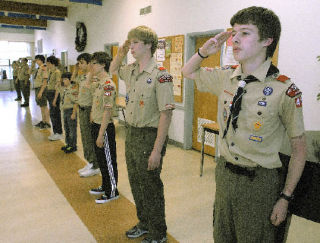Boy Scout outfit honors the past as it continues tradition of service
One is an orthodontist, another a judge.
There’s an attorney and someone with a Ph.D. in communications. A few are ordinary workers, several are successful businessmen. Many served honorably in the military while others remain on active duty.
They come from all walks of life, yet they share a common ground, a special association as alumni from Auburn’s storied Boy Scout Troop 401.
“Actually, I’m closer to some of these guys than with any other group,” said Bill Huitt, a former Marine and one of the troop’s 68 Eagle Scouts since the troop’s inception in 1923. “There’s a bond there, a brotherhood there.
“Just like when you joined the Corps … once a Marine, always a Marine,” he said. “It’s the same way with Eagle Scouts.”
Huitt, a road construction worker from Milton, will reunite with many of his fellow scouts today as Troop 401 celebrates its 85th anniversary at Auburn’s First United Methodist Church.
Troop 401 is the longest-running Boy Scout outfit in lower King County and one of the oldest units in its council and in the state. As Boy Scouts of America approaches its 100th anniversary in 2010, Troop 401 is proudly keeping the tradition alive by upholding the spirit and practice of honor, duty, trust, loyalty and service.
These Boy Scouts have done well. These Eagle Scouts have spread their wings.
“I’m pleasantly surprised,” said Auburn’s Sherrill Clark, a former scoutmaster who, along with his son Carl, has been with the troop since 1971. “A majority of the kids have gone on to good lives.
“It’s been great.” Clark added. “I’ve met all kinds of kids, and I’m very proud of what they’ve done. And a majority of them are just plain kids.”
Troop 401, in conjunction with it chartering partner, the Kiwanis Club of Auburn, has provided a scouting program since 1923 in the Cascade foothills community.
What began as Troop 1 under Scoutmaster Harlan R. Stone 85 years ago, remains as strong and visible in the Auburn community today.
Troop 401 of today is comprised of 33 strong under Scoutmaster Charles Slightman, 65, a retired Boeing technical writer and teacher who earned the troop’s 11th Eagle Scout honor as a youngster.
The year-round program is filled with activities and service – from camps and hikes, work parties to special tours, fundraisers to cleanup detail.
Scouting remains a viable outlet for today’s youth just as it was for Slightman as a boy.
“I think it’s stronger because we have better transportation today than yesteryear,” he said. “It’s more available, and we’re all more conscious of places where we can go.”
For Slightman, the significance of scouting continues to embrace the community today.
“It is in the growth of the individual, in God and America’s way,” he said. “We encourage the buildup of each other … knowing how to treat not only yourself, but others and how to be a healthy part of a group.”
The encouragement of personal and group growth is not lost on alumni. The scouting experience taught them not only discipline and camaraderie, but other life skills as well, such as First-Aid and survival. Many benefitted from the training, especially those who made a career out of the military.
“I remember my first patrol. I was 10 years old and had gone out on a camping trip,” said Sean Heath, a Troop 401 Eagle Scout who grew up and attended school in Auburn. “The older scouts went out of their way to make a connection with us. They talked to us, taught us a lot of skills.”
Heath has returned the favor. These days – in line to become a captain for the Washington State Army National Guard – he is training soldiers and other personnel at Fort Lewis for deployment. Heath recently returned after serving a year in Iraq.
“I enjoy teaching and working with others,” said Heath, a family man. “When I joined the military in 1994, I started using all those basic skills I took from scouting. They all helped and played a part in my (work) with the military. It helped me adapt to a higher standard that a soldier has to have.”
Huitt also entered the military well prepared. The Auburn High School graduate spent 10 years in the Marine Corps, working as a combat engineer during the first Iraq War in 1990-91.
He has done well for himself and his family, due in part to the values he learned through scouting.
“It puts things in proper perspective for you,” he said. “It’s not just about the person who is trying to move forward, but it’s about everybody moving forward. (Life) is an individual thing, but it’s a team effort all together.”
Becoming an Eagle Scout is something Huitt will always savor.
“At that time, it was real important for me because I wanted to be able to show my father that I could do that because he made it to that point. He was an Eagle Scout,” Huitt said. “It was quite important for me. … Not everybody can do it.”
Many scouts have succeeded, but others have struggled later in life.
Even so, scouting has left an impression through good and trying times.
Clark recalls a few years ago coming across a former scout. The man, apparently homeless, stood on a street corner carrying a cardboard sign.
“He thanked me for teaching him how to pitch a tent properly,” Clark recalled. “I considered that a compliment.”


